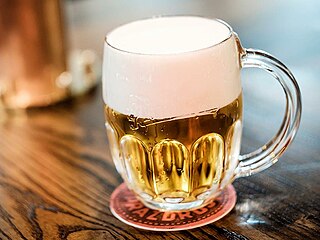
Pilsner is a type of pale lager. It takes its name from the Bohemian city of Plzeň, where the world's first pale lager was produced in 1842 by Pilsner Urquell Brewery.
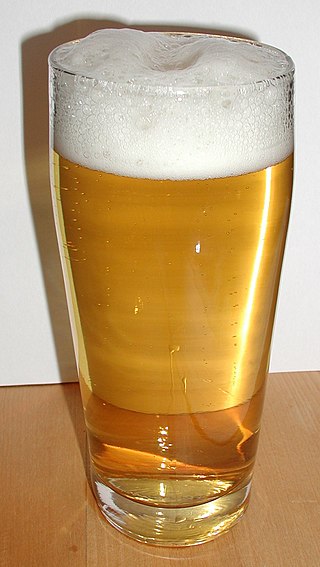
Helles or hell is a traditional German pale lager beer, produced chiefly in Southern Germany, particularly Munich. The German word hell can be translated as "bright", "light", or "pale".

Holsten Brewery is a brewing company founded in 1879 in what is now Hamburg's Altona-Nord quarter. The group now has seven breweries in Germany. Its nationally distributed premium brand is the pale lager Holsten Pilsener. The company was acquired by the Carlsberg Group in 2004.
Berliner Weisse is a cloudy, sour beer of around 3.5% alcohol by volume. It is a regional variation of the wheat beer style from Northern Germany, dating back to at least the 16th century. It can be made from combinations of malted barley and wheat, with the stipulation that the malts are kilned at very low temperatures or even air-dried to minimise colour formation. The fermentation takes place with a mixture of yeast and lactic acid bacteria, a prerequisite that creates the lactic acid taste, a distinguishing feature of Berliner Weisse.

Dortmunder Actien Brauerei is a German brewery in the city of Dortmund, founded in 1868 by the businessmen Laurenz Fischer and Heinrich and Friedrich Mauritz together with master brewer Heinrich Herberz. Originally, it was called Herberz & Co Brewery.

Gose is a warm fermented beer that originated in Goslar, Germany. It is usually brewed with at least 50% of the grain bill being malted wheat. Dominant flavours in gose include a lemon sourness, a herbal characteristic, and a strong saltiness. Gose beers typically do not have prominent hop bitterness, flavours, or aroma. The beers typically have a moderate alcohol content of 4 to 5% ABV.
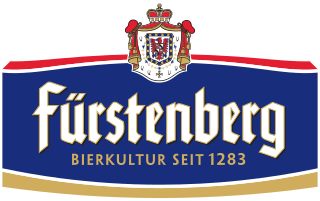
The Fürstenberg Brewery is a brewery in Donaueschingen, Germany. It has been a subsidiary of Brau Holding International since 2005, before which it was owned by the House of Fürstenberg, a German noble family. Among other offerings, the brewery produces pilsner, export, and wheat beer, primarily serving southern Germany.
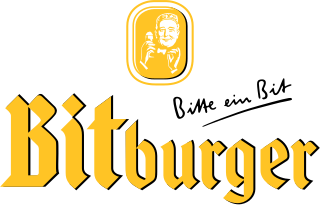
Bitburger Brewery is a large German brewery in Bitburg, Rhineland-Palatinate. Founded in 1817 by Johann Wallenborn, its Pilsner is the third best-selling in Germany, and the nation's top-selling draught beer.
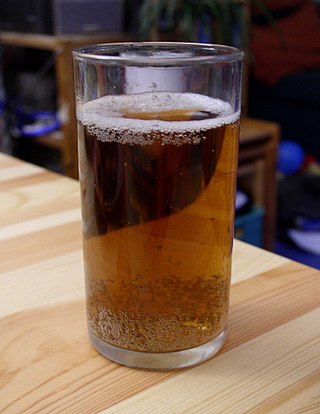
Fassbrause, literally "keg soda", is a non-alcoholic or alcoholic German drink made from fruit and malt extract, traditionally stored in a keg. The original Fassbrause also includes spices and is a speciality of Berlin, where it is sometimes called Sportmolle.

Sternburg is a brand of German beer, brewed and bottled by Radeberger Group. Their best selling product is "Sternburg Export". In 2006 it had 9.5% of the market share in Eastern Germany.

Radeberger started in 1872 when the brewery was founded as Zum Bergkeller, in Radeberg, a town in the vicinity of Dresden. Radeberger ranks No. 9 among Germany's best selling beers.
Brau und Brunnen AG was a German brewing and beverage group which was formed as "Dortmunder Union-Schultheiss Brauerei AG" in 1972 through a merger between Schultheiss-Brauerei and Dortmunder Union-Brauerei. It was renamed Brau und Brunnen in 1988. It owned a number of formerly independent breweries, including Einbecker Brewery. Until the early 1990s, Brau und Brunnen was the largest beverage company in Germany, but its market share steadily declined throughout the 1990s. An additional cause for the decline was the company's purchase of Bavaria – St. Pauli Brewery and Jever for an estimated 800 million DM, although these purchases were later estimated to only be worth closer to 250 million DM. Other companies engaged in a series of mergers and acquisitions, and by 1999, it had sunk to the fourth-largest beverage company and was continually losing money. After unsuccessful internal reorganizations, the company was purchased by Dr. August Oetker KG and integrated into its subsidiary Radeberger Gruppe.

Janssen & Bechly Brewery produced beer at Neubrandenburg, Germany from 1912 until the company was nationalized by East Germany in 1949. The brewery continued to produce beer under the Neubrandenburg and Nordbräu brand names until the company ended production in 1995. The Nordbräu brand was sold to the Mecklenburg brewery Lübzer in 1996.
Braugold Vertriebs GmbH & Co. KG was a prominent brewery located in Erfurt, a city in central Germany. The brewery was one of the largest in the state and, for a period, held the position of market leader in Thuringia, a federal state known for its rich brewing tradition.

The Upper Silesia Brewery, also called Browary Górnośląskie w Zabrzu, is a brewery in Zabrze, Poland, owned by the Van Pur brewery conglomerate.

Brauerei Diebels is a firm based in Issum on the Lower Rhine that manufactures various beer products. The company was a prominent shirt sponsor of Borussia Mönchengladbach during the 1990s.
Berliner-Kindl-Schultheiss-Brauerei GmbH is a brewery in Berlin, Germany, that produces Berliner Pilsner, Berliner Kindl, Schultheiss, and Berliner Bürgerbräu. Until 2004, it was part of the larger brewing company Brau & Brunnen, which was then purchased by Dr. August Oetker KG and integrated into the Radeberger Gruppe.
Radeberger Group is the largest brewery group in Germany. It is headquartered in Frankfurt am Main and produces beer at 16 different locations. With an approximate annual production volume of 13 million hectolitres, the group accounts for approximately 15% of German beer production.
Ur-Krostitzer is a brand of beer from Krostitz near Leipzig, Germany.













